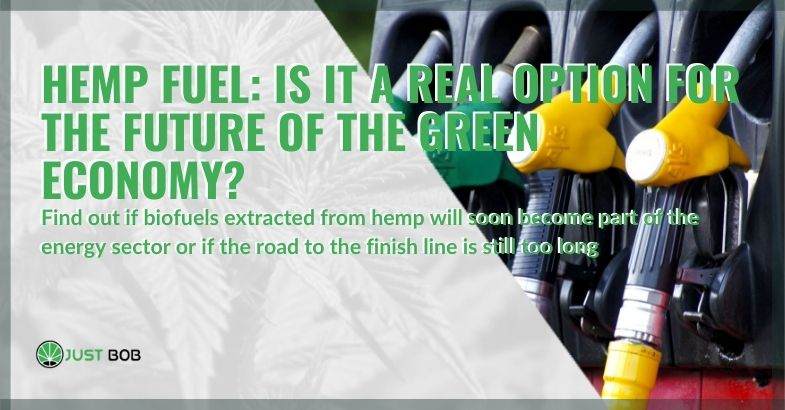Modified on: 17/01/2024
Find out if biofuels extracted from hemp will soon become part of the energy sector or if the road to the finish line is still too long
As the years go by, there is a growing awareness that our planet is suffering.
The entire global ecosystem is at risk. Global warming and the hole in the ozone layer are just some of the most important warning signs.
With this in mind, efforts are being made to find an alternative to today’s significant pollutants, among which are car fuels.
Is it possible to power cars with an environmentally friendly, renewable fuel without having to change engines?
The answer is yes, and the solution lies in legal hemp.
This plant could change the fuel industry forever while doing good for the environment in so many ways.
Here are the main benefits of using hemp fuel, the limits, and what is essential to know about it.


Bridging the Gap: Exploring the Potential of Hemp Biomass as a Sustainable Alternative to Fossil Fuels
In the relentless pursuit of sustainable energy solutions, the spotlight is increasingly turning towards hemp biomass as a viable and eco-friendly alternative to traditional fossil fuels. Industrial hemp, derived from the cannabis sativa plant, is not only renowned for its diverse applications but is now gaining recognition for its potential role in revolutionizing the energy production landscape. This article delves into the promising prospects of hemp biomass and its potential to reduce greenhouse gas emissions, offering a sustainable path towards renewable energy.
Industrial Hemp: A Versatile Resource:
Industrial hemp, unlike its psychoactive counterpart, boasts an array of uses beyond recreational or medicinal purposes. Its rapid growth, high biomass yield per hectare, and minimal need for pesticides make it an attractive candidate for sustainable agriculture. From textiles and building materials to nutrient-rich hempseed oil, hemp’s versatility extends to the realm of energy production.
Hemp Biomass vs. Fossil Fuels:
As the world grapples with the urgent need to reduce emissions and transition towards renewable energy, hemp biomass emerges as a potential game-changer. Unlike fossil fuels, hemp is a renewable resource that can be grown annually, offering a sustainable and environmentally friendly alternative. Hemp’s growth cycle, coupled with its ability to thrive in diverse climates, positions it as a promising contender in the quest for cleaner energy sources.
Reducing Greenhouse Gas Emissions:
One of the significant advantages of hemp biomass is its potential to reduce greenhouse gas emissions. The cultivation of hemp requires minimal synthetic fertilizers and pesticides, making it a greener option compared to traditional crops. Additionally, hemp absorbs carbon dioxide during its growth, acting as a carbon sink and contributing to a net reduction in emissions.
Hemp Co-Production and Waste Utilization:
Hemp’s utility extends beyond biomass alone. The waste products generated during hemp processing can be utilized efficiently. Through methods like dry distillation and cellulose content extraction, hemp waste can be converted into biofuels and other valuable by-products. This co-production approach not only maximizes the utility of the hemp plant but also minimizes waste and environmental impact.
Henry Ford’s Vision and Hemp Fuel:
Remarkably, the concept of using hemp as a fuel source is not entirely new. In the early 20th century, visionary innovator Henry Ford explored the potential of hemp-derived biomass to power his vehicles. While his vision faced challenges in its time, the contemporary focus on sustainability and the urgency of combating climate change reignites interest in hemp fuel as a tangible solution.
Suggested Returns and Economic Viability:
The economic viability of hemp biomass as an energy source is a crucial consideration. Preliminary studies suggest promising returns, especially when compared to other energy crops like corn. The potential for hemp co-production, coupled with its high biomass yield per hectare, positions it as an economically viable option for sustainable energy production.
How efficient is hemp biofuel?
In the quest for sustainable and renewable energy sources, hemp biofuel has emerged as a promising contender to challenge the dominance of fossil fuels. As the industrial and environmental advantages of hemp cultivation gain recognition, a closer examination of hemp biofuel efficiency becomes imperative. This article explores the key aspects of hemp biofuel, its production, and its potential impact on energy production and climate change.
Hemp as a Biomass Crop:
Hemp, scientifically known as Cannabis sativa, has gained attention not only for its versatile applications in textiles, building materials, and other products but also for its potential role in bioenergy production. The hemp plant, with its high biomass yield and rapid growth during the growing season, stands out as an efficient biomass crop compared to other energy crops.
Hemp Biofuel Production:
Hemp biofuel can be derived from various sources within the hemp plant, including hemp oil extracted from seeds, hemp biomass, and even hemp biochar. Hemp biodiesel, produced from hemp oil, has shown promise as a renewable alternative to conventional diesel, offering a cleaner-burning option for diesel engines.
Energy Yield and Environmental Benefits:
Studies indicate that hemp biofuel has a high energy yield per hectare, surpassing other energy crops. The process of producing hemp biofuel is seen as carbon neutral, as hemp cultivation absorbs carbon dioxide during its growth, contributing to a reduction in greenhouse gas emissions. Hemp’s ability to grow on marginal lands and remediate contaminated soils further positions it as an environmentally friendly bioenergy source.
Comparison with Other Energy Crops:
When hemp is compared with other energy crops, such as corn or other grains used for ethanol production, hemp’s efficiency becomes evident. The high yields and versatile applications of hemp products, ranging from hemp fibers to building materials, make it a multifaceted solution for a greener future.
Hemp Biofuel Types:
Hemp biofuel takes various forms, including solid fuels like hemp pellets, liquid fuels like hemp biodiesel, and even gaseous fuels like biogas produced through anaerobic digestion. Hemp co-production methods, such as the utilization of waste products for biochar or the process called cellulolysis to extract fuel from hemp fibers, showcase the versatility of this biofuel source.
Challenges and Future Prospects:
While hemp biofuel exhibits significant promise, challenges such as processing facilities, harvesting machine designs, and high-quality seed availability need to be addressed. Furthermore, the potential returns and scalability of hemp biofuel production on an annual basis must be thoroughly explored to ensure economic viability.
Hemp biofuel stands as a beacon of hope in the pursuit of renewable and sustainable energy sources. The efficiency of hemp biofuel, with its high biomass, carbon-neutral attributes, and diverse applications, suggests that it could play a pivotal role in reducing emissions and mitigating climate change. As hemp development continues to progress, it offers a glimpse into a future where hemp, as an energy crop, contributes significantly to the global transition towards a cleaner and more sustainable energy landscape.


Hemp biofuel: the solution for green driving
Today, many own cars. People use their cars to go to work, do their shopping, and even drive a short distance from home —cars are now used for all kinds of reasons!
For this reason, various environmental awareness campaigns have been launched, urging people to limit their car use and promoting the use of alternative means of transport such as bicycles.
Unfortunately, however, air quality is now compromised, so it is essential to consider other strategies.
What if it were possible to drive without polluting?
The idea of making biofuels from plants is not new in recent years but attempts to create fuels that are less harmful to the planet have been underway for some time.
At present, products made from corn and other plants are blended with petroleum-based fuels to limit their emissions, but what environmentalists hope is that we can eventually eliminate the harmful fuels.
That’s how they came up with the idea of hemp fuel, a product that can be used in cars without modification and is renewable and green and does not emit substances that are harmful to humans or the planet.
It may sound absurd, but that’s precisely what it is.
Once again, nature has made marijuana plants a unique resource in a significant field.
Legal cannabis plants are easy to grow, can be exploited in their entirety and have many other advantages (therapeutical use in the form of CBD oil for example)
So, what is stopping this historic breakthrough?
Is there a problem?
Hemp biodiesel: advantages and disadvantages
Before going any further, it is essential to point out that two types of fuel can be extracted from hemp: ethanol and biodiesel.
Ethanol is extracted from the hemp plant and biodiesel from its seeds.
At present, ethanol produced from plants apart from cannabis is mixed with other fuels to limit greenhouse gas emissions, while biodiesel is combined with other fuels to limit CO2 emissions.
But if plant-based fuels have not yet been fully integrated into the green fuel sector, it is because they have limitations:
-
being produced from food sources could lead to higher food prices;
-
the processing of some fuels results in the emission of too much CO2 and other harmful substances so that the ecological benefits would be diminished.
What about hemp?
Legal marijuana biofuel has been deemed an efficient product in tests by several car manufacturers, but let’s look at its pros and cons in detail.
Advantages of hemp biofuel and the cultivation of this plant
-
Hemp is much easier to grow than many other food crops and grows quickly;
-
growing marijuana means you can avoid using fertilizers that are harmful to the environment;
-
cannabis plants also grow in areas where the soil is impoverished or polluted and can reclaim it through rootwork;
-
potentially, growing hemp means being able to use every component of the plant;
-
Biodiesel from cannabis or CBD cannabis has a higher flashpoint than many other fuels, so it is safer to transport and handle.
Disadvantages of hemp fuel
-
If hemp were to become a fully-fledged substitute for petroleum-based fuels, there could be a risk of ‘deforestation’ due to the high production requirements.
-
According to a study by the Pennsylvania State University, biodiesel made from hemp is less efficient than diesel made from oil due to a lower BTU (energy unit) content.
Read also: Does albino cannabis exist, or is it just a myth?
To conclude
From what we have seen above, it is clear that to introduce fuels made from hemp entirely. It would be necessary to reorganize the agriculture and fuel production sector worldwide.
Otherwise, the danger of deforestation would be too great, and trying to solve one problem would create another.
In addition, hemp is still too demonized in many countries around the world today, so to say that in a few years, it will be possible to fill your car with the vegetable fuel produced by this plant would be too far-fetched.
What is certain is that oil sources are running out, that the planet is in grave danger and that it would be essential to intervene as soon as possible with a solution of this kind.
If you are an admirer of this plant, we invite you to visit our Justbob online store.
Choose from inflorescences, hashish, and CBD oil and complete your collection dedicated to cannabis and hemp and their many properties.
We look forward to seeing you in our CBD cannabis online shop. See you soon!









